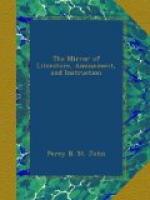Again, where the moody monarch says—
——What
comfort have we now?
By heaven! I’ll hate him everlastingly,
That bids me be of comfort any more.
Go, to Flint Castle, there I’ll
pine away;
A king, woe’s slave, shall kingly
woe obey.
Then, the investiture of the Castle—“Scene 3.—Wales—Before Flint Castle;” “Enter, with drums and colours, BOLINGBROKE and Forces.” “A parle sounded, and answered.—Flourish.—Enter on the walls KING RICHARD, &c.” Shakspeare makes the capture in the castle. Thus, Northumberland (from Bolingbroke before the castle) parleys with the King—
My lord, in the base court he doth
attend
To speak with you, may’t please you to come
down?
KING RICHARD.
Down, down I come; like glistering
Phaeton,
Wanting the management of unruly jades.
(North retires to Boling.)
In the base court? Base court, where kings
grow base,
To come at traitors’ calls, and do them grace.
In the base court? Come Down? Down Court,
Down King!
For night-owls shriek where mounting larks should
sing.
(Exeunt from above.)
Richard has been described as a prince of surpassing beauty; but his mental powers did not correspond with his personal form, and his character was both weak and treacherous. He, however, had some redeeming points. His ordering some trees to be cut down at Sheen, because they too forcibly reminded him of his deceased wife Anne, in whose company he used to walk under them, affords a favourable testimony of his susceptibility of the social affections. Of this sensitiveness, there is also an interesting trait recorded by Froissart. From Flint Castle, Richard was conveyed to London, and immured within the Tower cells. While he was here one day conversing with Bolingbroke, his favourite greyhound, Math, having been loosed by his keeper, instead of running to the King, as usual, fawned upon the Duke. The latter inquiring the cause of this unusual circumstance, was answered—“This greyhound fondles and pays his court to you this day as King of England, which you will surely be, and I shall be deposed.”
To return to Flint Castle. After the civil wars under Charles I. it was ordered to be dismantled; but, among other rights, it was restored to Sir Roger Mostyn, after the Restoration, in whose family it is still vested, though the mayor of the borough acts as its constable.
* * * * *
SPIRIT OF THE PUBLIC JOURNALS.
* * * * *
WEBER AND DER FREISCHUTZ.




